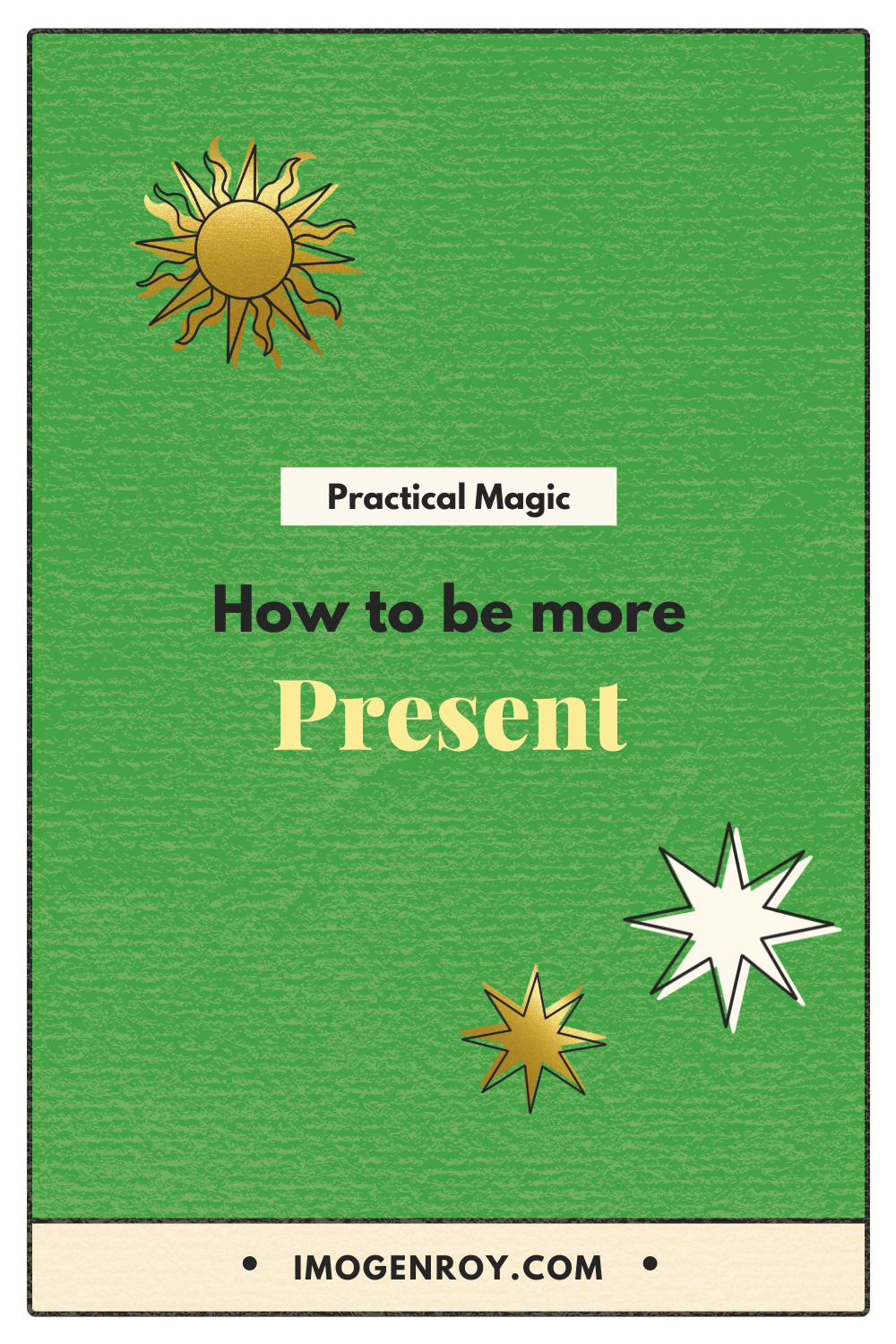Practical Magic | How To Be More Present
We all value presence, but how does it actually work? In this episode, I break down the dynamics of different states of attention so we can show up more connected, more satisfied, improve our memories and enrich all our relationships.
What Does It Mean to Be Fully Present?
Presence is something that we all value and want to bring more of to our lives. You may have noticed that when I talk about my work as a business mentor and coach, I talk about helping people be more productive, purposeful, and present in their life and work.
In this episode, I talk more specifically about what I believe presence really means, tangible steps to achieve presence, and the incredible benefits we can see in our lives, beyond magical living, when we start to practice this form of presence.
Much of my reflection, practice, and experience in this topic has been greatly enriched by Kasia Urbaniak, who is the co-founder and CEO of The Academy, the school of power for women. Kasia is my teacher, mentor, and creative collaborator. She speaks at length that the fundamental building blocks of power dynamics in relationship, communication, and how we engage with the physical and spiritual world is based on the understanding that there are three types of attention.
The Three Types of Attention
1. The Dominant State of Attention
When we are in the dominant state of attention, we have our attention out on something. We are looking, listening, observing, describing, handling, doing. We're focused on something outside of us. In this state of attention, we can almost forget who we are because we're so focused on what's going on outside of us.
2. The Submissive State of Attention
When we are in the submissive state of attention, we have our attention on ourselves. We are feeling, remembering, receiving (receiving someone's words, receiving an experience, or receiving a massage), watching a film, being told a story. We are captivated by something that is deeply affecting us on an individual level. This state of attention and presence is that you are present to yourself.
3. Attention on Attention Itself, Meditation
It is a meta experience to bring attention to the act and experience of what it feels like to bring attention to something.
The dominant state of attention has nothing to do with control, coercion, or being domineering, and the submissive state of attention has nothing to do with identity, being a submissive person, or being out of control. These two states are neutral. They are ones in which we move in and out of all day long.
You Are Present When You Occupy One of These Three States Fully
We are fully present when we are fully in the dominant state of attention: paying attention to someone, being with them, watching them, watching how emotion moves through their face and body, watching someone perform, being engrossed in a task or an activity, or making something.
Likewise, we are fully present when we are fully in the submissive state of attention: feeling an emotion, listening to someone speaking to you without thinking of what you’re going to say next, watching a movie and not simultaneously making a shopping list or thinking about things you need to handle once the film is over, or in meditation.
Presence is only possible when we are fully occupying one state of attention at a time. It's not about how long you stay there – it can be a millisecond or minutes – but whether you are fully occupying it.
Sadly, because of the frantic pace of our world and all the ways in which we are rushed, many of us spend our days in neither one place nor another. In this liminal existence, half in the dominant state and half in a submissive state, when we receive a massage we can't fully receive it. We're not fully present in the submissive state of attention because we're also thinking about all the things that we need to do in our day and in our week. Therefore we're neither here nor there. Once the massage is over, it feels hard to integrate that and you don't quite remember how it felt.
Likewise, let's say you're cooking a new recipe that requires focus. It requires the dominant state of attention; you need to read and think about what to do next. Filling the ingredients, measuring things accurately, and watching your pots as the ingredients begin to transform. However, if you're doing that whilst replaying an argument in your head with someone from earlier that day and thinking of how it made you feel, then you're neither here nor there. You're not fully in the dominant state of attention; you're not present to cooking. So your food will likely to be lackluster: overcooked or undercooked and you can't connect with it.
One thing I often observe is when someone is offering the host or a guest a gift at a party. Instead of being able to fully receive the gift and be present by being fully occupying the submissive state of attention as they open the gift, they are perhaps talking to someone else at the same time, looking somewhere across the room, or figuring out who needs a drink. It's a common occurrence, but it creates a terrible lack of presence.
This lack of presence that comes from never fully occupying one state of attention at a time has grave consequences. For the person at the party receiving the gift, they may accidentally come across as cold, unappreciative, and disconnected. But it runs much deeper than that.
When we are not fully in the dominant state of attention, we can't truly see or understand what's happening or what’s needed around us.
When we are fully in the dominant state of attention and fully present to someone or something, we are so much more likely to be a great conversationalist, to be able to guide people towards what you want, to make them laugh, to become an incredibly talented cook, artist, carpenter, DIY-er, or lover.
By practicing the dominant state of attention at the right moments, we are paying attention to what's needed.
When we are not fully in the submissive state of attention and fully present to receiving someone or something, we can't fully receive our wins, victories, or intuitive nudges. We’re not able to fully receive and appreciate the gestures, acts, and ways in which people around us are trying to please us. We’re also not able to receive the fullness of their support.
Another consequence of not being present in this way is that we are never satisfied. It feels like we never have enough so we're always seeking more, more more.
One of the Most Alarming Consequences of Not Being Present
One of the most alarming consequences of not practicing being present is that it has a profound effect on our memory.
Multitasking is physically impossible for the human brain; it does not have the wiring capacity to focus our attention in two places at once. However, when we force ourselves to multitask, we become disconnected. Our attention is nowhere. We can't create and record a full memory, which often leads to us not being able to remember how you passed the time at the end of the day, month, or year.
Because we were never there.
This lack of presence creates and accentuates the mind-body disconnection that can lead to burnout, illness, and profound disembodiment.
When we are not present, our mind and body are not in the same place together.
Not only is this profoundly destabilizing and anxiety inducing, it generates the same reaction in others. We come across as scattered, inauthentic, incongruent, and confusing to the people around us.
How Can We Train in Presence?
The key is in the word practice.
Start small. Practice what it feels like to keep your attention in one place at a time.
If you want to train the dominant state of attention, practice keeping your attention out on something and really seeing it, hearing it, and observing it.
For example, I have a plant on my desk. Sometimes I stop and simply look at my plant deeply. I notice that some of its leaves have grown in size, some of them have a brown tinge around the edge which suggests I'm not giving it as much attention as I should. I look at how the light dances across the faded terracotta pot. I see tiny baby shoots tickling their way out from underneath the leaves which I didn't notice yesterday.
You can train your attention in this way with a plant, with a painting, with another person. Anything that requires you to pay attention to something that is going on outside of yourself.
Cooking is another great place to train your dominant state of attention. Practice keeping your attention there. Linger there far longer than feels comfortable before you return to a voice, memory, or replay that's happening in your emotional experience.
When it feels like the right time to go in, fully occupy that submissive state of attention on yourself. Let's say an emotion has arisen: linger there a little longer than you normally would.
Can you name that feeling?
Have you felt this before?
Where do you feel it in your body?
Is it moving?
What does it remind you of?
This is how you practice developing presence to yourself, presence to what's going on. Bring your attention fully to your own experience rather than rushing to look at something outside of yourself to escape the discomfort.
When we are fully present in the submissive state of attention, we can hear our inner signal, we can feel what our body is trying to tell us, and we can receive intuitive messages. It is a place of profound power and awareness if you are able to be present there long enough.
Presence is hard, and it's not an intellectual exercise. It's something you do with all parts of your body.
But it's worth practicing.
With greater presence comes greater connection.
When we are fully present In a dominant state of attention, we can see and know what's needed.
When we are fully present in the submissive a state of attention, we are able to receive and be satisfied. In fact, you can receive what you already have, as opposed to constantly chasing some other form of indulgence or nourishment.
Radical presence allows you to record whole, full, clear memories, which changes your relationship to time. Suddenly time doesn't feel like something you never have enough of. Your experience of time is punctuated and peppered by fascinating narratives, experiences, memories, and emotions that are recorded by your attention in all parts of your body. When you are present in this way, the people around you change. When they sense that you're present to them, they’re far more likely to honor you in this way.
This kind of connection makes a life truly magical.
I invite you to start experimenting, training, practicing the art of presence today. See what it feels like to fully occupy one of the three states of attention at a time.
One at a time.
Understand that every moment that you spend rushing, distracted, and trying to be in many places at once with your attention is a moment lost forever.
Listen to the Full Episode:
Pin This Episode for Later:





